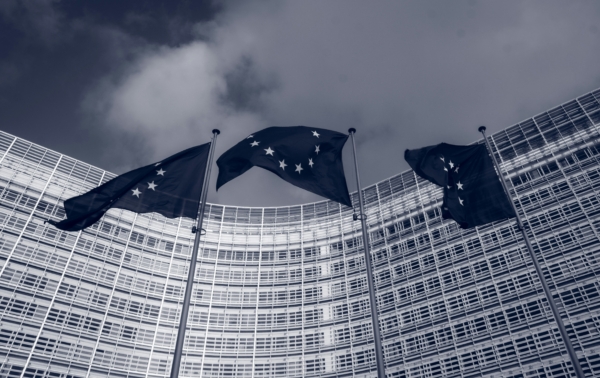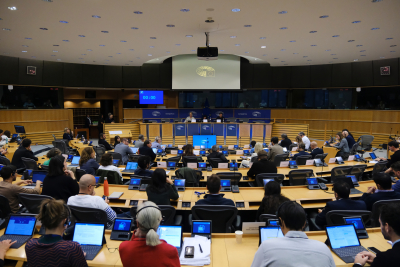Disclaimer
Since the publication of this research, many MEPs have updated their personal pages on the European Parliament website, either to add new third-party event declarations, or to remove ones previously submitted, for instance on the grounds that they did not actually involve payments by third parties and therefore should not have been submitted by these MEPs in the first place.
These updates do not impact the present analysis, which is a snapshot of the situation on 13 February 2023 based on the declarations submitted by MEPs before that time. The most recent state of play is available under the ‘MEP income’ tab on integritywatch.eu, which automatically collects the data from the EP website and is updated twice a month.
Transparency International EU only uses data made available by the European Parliament through its official website. It is the responsibility of MEPs and the Parliament’s administration to ensure the accuracy of the data and the conformity of declarations with the relevant EP rules.
The Qatargate scandal which rocked the European Parliament in December 2022 put a spotlight on the relationship between third countries and MEPs.
One consequence has been a flurry of transparency activity, with MEPs rushing to publish declarations about their attendance at events paid for by third parties – better known as freebies or junkets.
In 2013 a rule was introduced the MEP code of conduct whereby MEPs must declare every event organised by a third party where their travel, accommodation or subsistence expenses were paid for or reimbursed by a third party.
They must do this no later than the last day of the next month following the final day of attendance at the event.
While on paper this is a good rule, it seems that many MEPs have not been adhering to it.
Transparency International EU has analysed all third party event (or ‘travel’) declarations submitted by MEPs since the start of the current parliamentary term in 2019
Number of declarations submitted per month since June 2019
We found that out of a total of 321 declarations submitted during the first 3.5 years of the current term, a whopping 103 (or 32%) were submitted during the two-month period since start of Qatargate.
This means that at least 53 MEPs were in breach of the Parliament’s own code of conduct. We say ‘at least’, because there may well be MEPs who have yet to submit declarations for past events. Rather than granting these MEPs an amnesty, as some have suggested, the EP should sanction them, to set an example and make sure it doesn’t happen again.
Share of late submissions since Qatargate and share of late submissions since July 2019
Out of the declarations filed submitted and published on the Parliament’s website between 8 December 2022 and 10 February 2023, 67% were submitted late. One declaration, by RE MEP Svenja HAHN, was submitted an eye-popping 1254 days late. In the top-10 of most delayed declarations, Qatar appears three times as a destination.
MEP ranking for number of days submitted after the last day of event attendance
A breakdown by political group shows that while the EPP had by far the largest number of event declarations overall, 60% of submissions by S&D MEPs were late, a higher figure than any other group. One explanation is that S&D MEPs are simply bad at filing their declarations on time. Another explanation is that they are scrambling to restore their integrity credentials in the wake of a scandal that has hit the Socialists hardest.
Number of late declarations by political group versus total submitted
Some of the third party event declarations (which can be found on MEPs’ individual pages on the European Parliament website) detail trips to far-flung destinations, often ones with questionable human rights records.
Israel (30), India (23) and United Arab Emirates (16) were the favourite paid-for travel destinations for MEPs since 2019. Within the EU, most expenses-paid trips were to Germany (41), France (14) and Poland (13).
Number of declarations submitted by destination country (total)
Of the declarations submitted since December 2022, 67% are in relation to events in non-EU countries.
Number of declarations submitted by destination country (post-Qatargate)
The most pampered MEPs – those with the most declared trips under their belt – are Reinhard BÜTIKOFER (Germany, Greens/EFA, 22), Radosław SIKORSKI (Poland, EPP, 14) and Katarina BARLEY (Germany, S&D, 13). It should be noted that these three MEPs made most of their declarations before the Qatargate scandal broke.
The MEP who filed the most declarations post-Qatargate is José Ramón BAUZÁ DÍAZ (Spain, RE, 8). Fun fact: Mr. Bauzá Díaz became chair of the EU-Qatar friendship group in 2021.
MEPs with most declarations sorted by post-Qatargate, pre-Qatargate and total
This latest flurry of scandal-driven transparency activity demonstrates once again that the Parliament is incapable, unwilling, or both to enforce its own ethics rules. Self-policing doesn’t work. The system isn’t fit for purpose.
President Metsola’s reform proposals (presented behind closed doors!) are a big step in the right direction, but they don’t go far enough.
MEPs should be free to take part in events organised by third parties – but they (or the Parliament) should cover the costs. Travel and event freebies pose a threat to the integrity of the Parliament’s work and should be banned altogether.
An independent EU ethics body with real powers of investigation and enforcement should be set up to make sure the EU institutions, including the Parliament, stick to the highest standards of transparency and integrity.
For more detail on the methodology, please download this pdf







